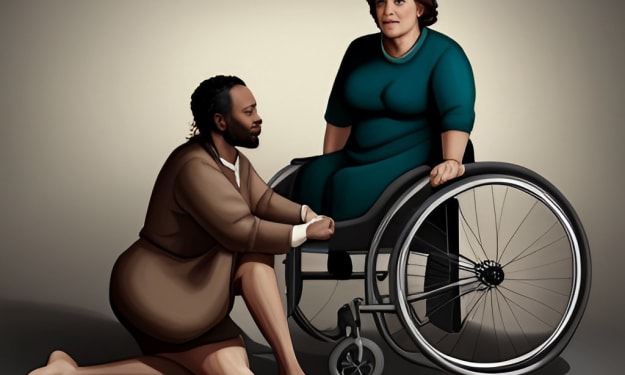Mental Health and Social Security Disability: Breaking Down the Criteria for Approval
Social Security Disability & qualifying for mental disability.

Mental Health and Social Security Disability: Breaking Down the Criteria for Approval
Understanding the link between Mental Health and Social Security Disability is no easy task. Many folks wonder if they can get help from the Social Security Administration (SSA) for mental health issues. The answer is yes, but the criteria can be tough to navigate. This post will break down the approval process, making it easier to understand.
The SSA uses a strict set of guidelines to decide who qualifies for disability benefits. Mental health conditions are included, but they require proof. You'll need to show that your mental health prevents you from working. Don't worry; we'll explain it all in simple terms.
We'll also provide tips on how to improve your chances of approval. So, let's dive into the complex world of Mental Health and Social Security Disability. We're here to clear up the confusion and shed light on the process.
Understanding Mental Health and Social Security Disability
What is Social Security Disability?
When it comes to navigating the complexities of Social Security Disability, understanding the criteria for approval can make all the difference. Social Security Disability is a government program designed to provide financial assistance to individuals who are unable to work due to a disability. The program is administered by the Social Security Administration (SSA) and offers two types of benefits: Social Security Disability Insurance (SSDI) and Supplemental Security Income (SSI).
SSDI is available to individuals who have worked and paid Social Security taxes for a certain number of years. On the other hand, SSI is a needs-based program for individuals with limited income and resources. Both programs have specific eligibility criteria, but for the purpose of this article, we will focus on mental health conditions and their impact on Social Security Disability approval.
The Impact of Mental Health Conditions on Daily Functioning
Mental health conditions can have a profound impact on a person's ability to function in their daily lives. Conditions such as depression, anxiety disorders, bipolar disorder, and schizophrenia can make it extremely challenging for individuals to maintain employment and sustain a productive lifestyle.
The symptoms of mental health conditions can manifest in various ways, affecting cognitive abilities, concentration, memory, and social interactions. These challenges can hinder an individual's capacity to perform work-related tasks, meet deadlines, and effectively communicate with others.
The Importance of Seeking Proper Treatment and Documentation
Seeking proper treatment and obtaining appropriate documentation is crucial when applying for Social Security Disability benefits based on a mental health condition. It is essential to establish a record of medical treatment received and the impact the condition has on one's ability to work.
Treatment for mental health conditions may include therapy, counseling, medication management, and other interventions. It's important to consistently engage in treatment and follow the prescribed plan to demonstrate an ongoing effort to manage the condition.
Documentation of treatment should include medical records, psychiatric evaluations, therapy notes, and any other relevant documentation that provides a comprehensive picture of the individual's condition and its impact on their daily functioning.
By actively seeking treatment and documenting the effects of their mental health condition, individuals can strengthen their case for Social Security Disability approval.
In conclusion, understanding the criteria for Social Security Disability approval is crucial, particularly when dealing with mental health conditions. Mental health issues can significantly impact a person's daily functioning, making it difficult to maintain employment. Seeking proper treatment and obtaining thorough documentation is essential to demonstrate the severity and impact of the condition on one's ability to work. By following these steps, individuals can increase their chances of securing the financial assistance they need through Social Security Disability.
Criteria for Approval of Social Security Disability for Mental Health Conditions
When it comes to applying for Social Security Disability benefits for mental health conditions, there are specific criteria that need to be met in order to be approved. In this section, we will break down these criteria and guide you through the process of understanding what it takes to be approved for Social Security Disability for mental health conditions.
The Five-Step Sequential Evaluation Process
The Social Security Administration (SSA) uses a five-step sequential evaluation process to determine eligibility for Social Security Disability benefits. This process helps to ensure that only those who truly meet the criteria receive the necessary assistance. Let's take a closer look at each step:
Substantial Gainful Activity (SGA): The first step involves evaluating whether the applicant is currently engaged in substantial gainful activity. If the individual is earning above a certain amount, they may be considered able to work and not eligible for benefits.
Severe Impairment: The second step involves determining if the mental health condition is considered severe enough to significantly impact the individual's ability to perform basic work-related tasks. If the condition is not severe, the application may be denied.
Meeting the Definition of Disability: At this stage, the SSA examines whether the mental health condition meets their definition of disability. They consider factors such as the duration of the condition, the impact on the ability to work, and the individual's medical records.
Listing of Impairments for Mental Disorders: The SSA maintains a comprehensive list of impairments for mental disorders that may automatically qualify an individual for disability benefits. If the applicant's condition matches the criteria outlined in the listing, they may be approved for benefits without further evaluation.
Demonstrating Severity and Functional Limitations: If the mental health condition does not meet the specific criteria outlined in the listing, the SSA will assess the severity and functional limitations caused by the condition. This evaluation considers factors such as the individual's ability to concentrate, interact with others, and adapt to changes in the workplace.
Meeting the Definition of Disability
To qualify for Social Security Disability benefits, an individual must meet the SSA's definition of disability. According to the SSA, disability is defined as the inability to engage in substantial gainful activity (SGA) due to a medically determinable physical or mental impairment that has lasted, or is expected to last, for at least 12 months or result in death.
Listing of Impairments for Mental Disorders
The SSA maintains a specific listing of impairments for mental disorders, known as the "Blue Book." This listing provides detailed criteria for various mental health conditions that may automatically qualify an individual for disability benefits. Some common mental disorders listed in the Blue Book include schizophrenia, bipolar disorder, and major depressive disorder.
Demonstrating Severity and Functional Limitations
Even if an individual's mental health condition does not meet the specific criteria outlined in the Blue Book, they may still be eligible for Social Security Disability benefits. The SSA will evaluate the severity and functional limitations caused by the condition to determine if the individual is unable to work. This evaluation takes into account the impact on the individual's ability to perform work-related tasks and function in a work environment.
In conclusion, understanding the criteria for approval of Social Security Disability for mental health conditions is crucial when applying for benefits. The five-step sequential evaluation process, meeting the definition of disability, the listing of impairments for mental disorders, and demonstrating severity and functional limitations are all important factors in determining eligibility. By familiarizing yourself with these criteria, you can better navigate the application process and increase your chances of receiving the support you need.
Medical Evidence and Documentation
When it comes to applying for Social Security Disability benefits based on mental health conditions, one of the key factors that can greatly influence the outcome of your claim is the medical evidence and documentation you provide. In this section, we will explore the importance of medical records and treatment history, the role of mental health professionals, and the distinction between objective medical evidence and subjective symptoms.
Medical Records and Treatment History
To support your Social Security Disability claim for a mental health condition, it is crucial to provide comprehensive and up-to-date medical records. These records should include a detailed account of your treatment history, including any medications prescribed, therapy sessions attended, and hospitalizations, if applicable. The more thorough and consistent your medical records are, the stronger your case becomes.
When it comes to mental health conditions, some individuals may be hesitant to seek treatment or to maintain regular appointments due to stigma or other personal reasons. However, it is essential to prioritize your well-being and establish a consistent medical record. This will not only benefit your claim but also contribute to your overall mental health and recovery.
The Role of Mental Health Professionals
The involvement of mental health professionals is crucial in establishing the validity and severity of your mental health condition. Psychiatrists, psychologists, therapists, and counselors play a vital role in diagnosing, treating, and documenting your condition. Their expertise and professional opinions carry significant weight in the evaluation of your disability claim.
When seeking medical evidence for your claim, it is recommended to consult with a mental health professional who specializes in your specific condition. This ensures that you receive the most accurate diagnosis and appropriate treatment, which can significantly enhance the credibility of your claim.
Objective Medical Evidence vs Subjective Symptoms
In evaluating a disability claim, the Social Security Administration (SSA) places a higher emphasis on objective medical evidence rather than subjective symptoms. Objective evidence refers to measurable data, such as clinical observations, laboratory test results, and diagnostic imaging, that objectively supports the presence and severity of your mental health condition.
Subjective symptoms, on the other hand, are those experienced by the individual but cannot be objectively measured or observed by others. Examples of subjective symptoms in mental health conditions may include feelings of anxiety, depression, or difficulty concentrating. While these symptoms are undoubtedly significant and can greatly impact your daily functioning, it is important to provide objective evidence alongside subjective symptoms to strengthen your claim.
In conclusion, when applying for Social Security Disability benefits based on a mental health condition, providing strong medical evidence and documentation is crucial. By maintaining comprehensive medical records, seeking the expertise of mental health professionals, and highlighting objective evidence alongside subjective symptoms, you can significantly enhance the chances of approval for your disability claim.
The Role of Work History and Vocational Factors
When it comes to applying for Social Security Disability benefits based on mental health conditions, a crucial aspect that the Social Security Administration (SSA) considers is an individual's work history and vocational factors. These factors play a significant role in determining whether an individual is eligible for disability benefits. In this section, we will explore two important aspects related to work history and vocational factors: Past Relevant Work and Transferable Skills, and Vocational Expert Testimony.
Past Relevant Work and Transferable Skills
The SSA takes into account an individual's past relevant work to assess their ability to perform substantial gainful activity (SGA). Past relevant work refers to any work that an individual has done in the past 15 years, which lasted long enough for them to learn the job and acquire the necessary skills. The SSA evaluates whether the individual can still perform this past work or if their mental health condition prevents them from doing so.
Transferable skills are also considered when assessing an individual's ability to perform work. These skills are abilities that the individual acquired from their past work and can be used in a different occupation. The SSA identifies transferable skills by comparing the individual's past work experience with the requirements of other jobs in the national economy.
Vocational Expert Testimony
In some cases, the SSA may require vocational expert testimony to assist in evaluating an individual's work history and vocational factors. A vocational expert is an individual who has specialized knowledge and experience in the area of employment and vocational rehabilitation. They provide their opinion on whether an individual's mental health condition prevents them from performing their past work or any other work in the national economy.
The vocational expert considers various factors such as the individual's age, education, work experience, and limitations caused by their mental health condition. They provide valuable insight into the individual's ability to adapt to different work environments and perform specific job tasks. Their testimony helps the SSA make an informed decision regarding the individual's eligibility for Social Security Disability benefits.
In conclusion, work history and vocational factors have a significant impact on the evaluation of a claim for Social Security Disability benefits based on mental health conditions. The SSA thoroughly assesses an individual's past relevant work, transferable skills, and may even seek the expertise of a vocational expert. Understanding these factors is crucial in presenting a strong case for approval of disability benefits.
The Application and Appeals Process
When it comes to seeking Social Security Disability benefits for mental health conditions, it's crucial to understand the application and appeals process. This section will guide you through the necessary steps, ensuring you have all the information you need to navigate this complex system.
Gathering Required Documentation
Before applying for Social Security Disability benefits, you must gather all the necessary documentation to support your claim. This documentation serves as evidence to substantiate your mental health condition and its impact on your ability to work.
Start by collecting medical records, including diagnoses, treatment history, and any evaluations or assessments conducted by mental health professionals. It's also important to provide documentation of any hospitalizations, medications prescribed, and their effects on your daily functioning.
In addition to medical records, gather any work-related documentation that highlights your inability to perform your job due to your mental health condition. This may include performance evaluations, letters from employers or colleagues, and any other relevant information that demonstrates the impact of your condition on your ability to work.
By preparing a comprehensive collection of documentation, you provide a strong foundation for your Social Security Disability application.
Applying for Social Security Disability Benefits
Once you have gathered all the necessary documentation, you can proceed with the application process. Applying for Social Security Disability benefits involves completing an extensive application form and providing supporting documentation.
The application form will require detailed information about your personal background, work history, medical conditions, and treatment received. Take your time to fill out the form accurately and ensure you provide sufficient details about your mental health condition and its impact on your ability to work.
Additionally, include all the supporting documentation you have gathered, as this will strengthen your application and increase the chances of approval. Submitting a well-prepared and comprehensive application is crucial in obtaining Social Security Disability benefits for mental health conditions.
Appealing a Denial
If your initial application for Social Security Disability benefits is denied, don't be discouraged. Many applicants face denials at this stage, and it's important to remember that you can appeal the decision.
To initiate the appeals process, you must submit a written request for reconsideration within the specified timeframe. When appealing a denial, it's essential to review the reasons provided for the denial and address any shortcomings in your initial application.
Along with the request for reconsideration, you should include any new or updated medical records or other relevant documentation that supports your claim. Take this opportunity to strengthen your case by providing additional evidence of the severity and impact of your mental health condition.
Requesting a Hearing
If your request for reconsideration is denied, the next step in the appeals process is requesting a hearing before an administrative law judge. This is often the most crucial stage for obtaining Social Security Disability benefits for mental health conditions.
During the hearing, you will have the opportunity to present your case in person, sharing your personal experiences, medical evidence, and any other relevant information. It is essential to be well-prepared, organized, and able to effectively communicate how your mental health condition limits your ability to work.
Consider seeking assistance from a qualified attorney or advocate experienced in Social Security Disability cases. They can help you prepare for the hearing, guide you through the process, and ensure you present a compelling case to the administrative law judge.
Remember, the appeals process can be lengthy and challenging, but it's important to persist and advocate for your rights. With proper preparation, documentation, and the determination to navigate the system, you increase your chances of success in obtaining Social Security Disability benefits for your mental health condition.
Conclusion
In conclusion, understanding the criteria for approval of Social Security Disability benefits for mental health conditions is crucial for individuals seeking assistance. Meeting the requirements set forth by the Social Security Administration can be challenging, but it is not impossible. By carefully documenting medical evidence, seeking professional support, and providing detailed information about the impact of the mental health condition on daily functioning, applicants can increase their chances of approval. Additionally, it is important to remember that the process may take time and patience, but the potential benefits can greatly improve the quality of life for those struggling with mental health issues. If you or someone you know is facing these challenges, it is recommended to consult with a qualified attorney or advocate who specializes in Social Security Disability claims to ensure the best possible outcome.
About the Creator
Jason Baril
Hello, everyone! My name is Jason Baril, and I'm excited to share my story with you all. attorney, I have a few passions that keep me busy - law, pickleball, technology, and writing.






Comments
There are no comments for this story
Be the first to respond and start the conversation.